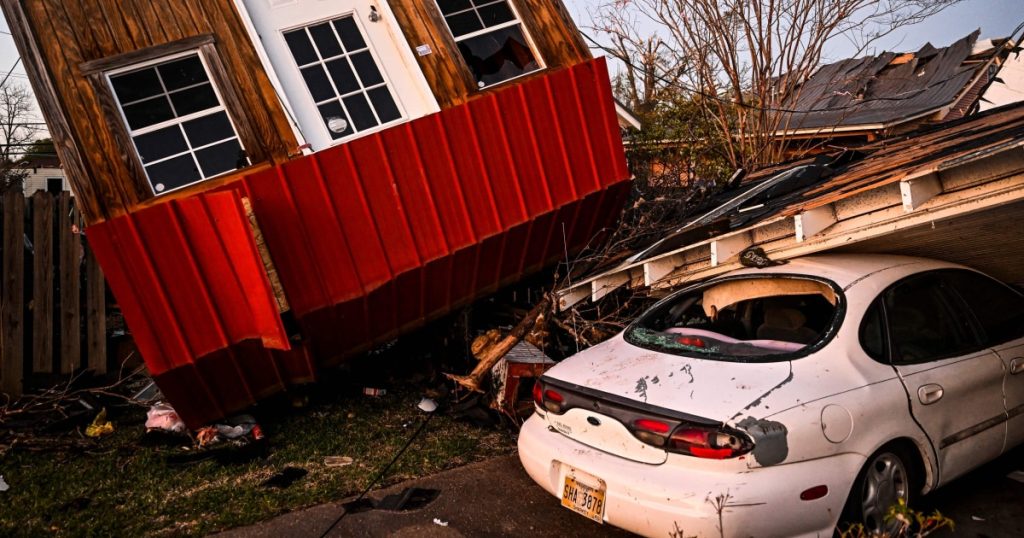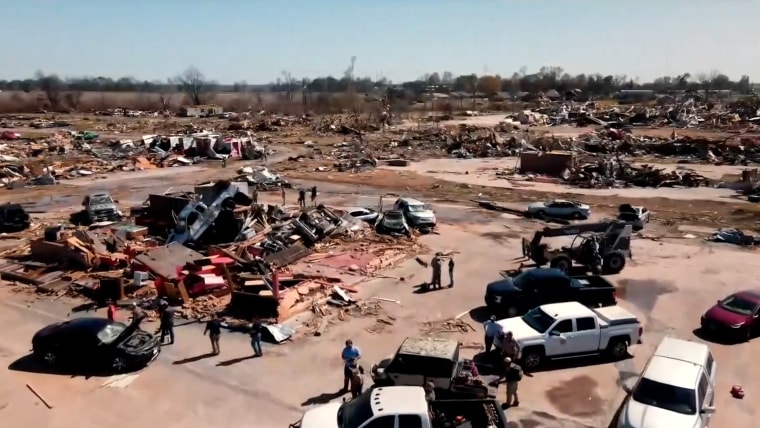
The tiny rural town of Rolling Fork, Miss. lies in ruins.
Trees toppled, roofs collapsed, power lines and poles listing precariously over roads after a tornado reduced much of it to rubble as it ripped through the Mississippi Delta late Friday, leaving a trail of devastation in one of the poorest regions of the country.
At least 25 people were killed in Mississippi and one man died in Alabama.
“It sounded like a freight train,” Andrew Dennard told NBC News Saturday, adding that an airborne piece of wood narrowly missed his head as it crashed into his home in Rolling Fork, shattering glass. “I don’t think we’re going to rebuild from this,” the 28-year-old added. “It’s worse than death.”
Early Sunday, President Joe Biden declared a major disaster in Mississippi and ordered federal aid to supplement recovery efforts, the White House said in a statement. Deanne Criswell, administrator of the Federal Emergency Management Agency, was also scheduled to visit on Sunday to evaluate the destruction.
But as recovery efforts continued, the National Weather Service Storm Prediction Center warned that severe thunderstorms will bring “the possibility of a couple of strong tornadoes” across the central gulf states on Sunday.
As a result, the Mississippi Emergency Management Agency tweeted that residents should “have a plan” and “know their safe place.”
It came after Gov. Tate Reeves issued a state of emergency and vowed to help rebuild the region dotted with wide expanses of cotton, corn and soybean fields and catfish farming ponds. More than half a dozen shelters were opened in the state to house those displaced.
Based on early data, Friday’s tornado received a preliminary EF-4 rating, the National Weather Service office in Jackson said in a tweet late Saturday, adding that it was still gathering information.
An EF-4 tornado has top wind gusts between 166mph and 200mph, according to the service.
Preliminary information based on estimates from storm reports and radar data indicate the tornado was on the ground for more than an hour and traversed at least 170 miles, Lance Perrilloux, a meteorologist with the National Weather Service’s office in Jackson, told the Associated Press.
“That’s rare — very, very rare,” he said, attributing the long path to widespread atmospheric instability. He added that preliminary findings showed the tornado began its path of destruction just south-west of Rolling Fork before continuing north-east towards the rural communities of Midnight and Silver City and onwards toward Tchula, Black Hawk and Winona.
In Rolling Fork — the birthplace of Mississippi Delta blues musician Muddy Waters — Meg Cooper, a coordinator with Lower Delta Partnership, a nonprofit cultural programming and business group in the region said Saturday that the damage was “extensive and devastating.”
“This tornado cut a wide path destroying homes and most of our businesses,” she said, adding that damage to cultural monuments, including a site marking Waters’ birthplace, was not yet clear.
Holding a donated hamburger on the front porch of her damaged trailer home in the town, in a separate interview Velma Warren said that she had never seen anything like the tornado.
“I thought we were dead,” said Warren, 62, adding that she had taken cover in a closet with her two young grandchildren.
While her home had two shattered windows, the damage was relatively minor compared to other properties nearby which had been crushed by trees and ripped open by the wind.
“I don’t care if I don’t have shoes or a hat, I’m going to go to church in the morning,” she said.
Bracey Harris, Dennis Romero and Associated Press contributed.
 Latest Breaking News Online News Portal
Latest Breaking News Online News Portal






